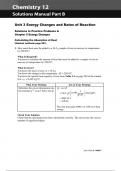Book review
McGraw-Hill Grade 12 Chemistry - Thermodynamics step by step answers
This file include all step by step answers for thermodynamic practice questions relating to enthalpy, Hess' Law, Heat of Formation, and all other thermochemical equations.
[Show more]




